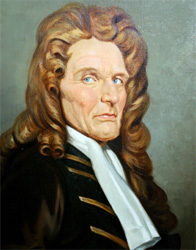| Profile | Major Works | Resources |
Nicholas Barbon, 1637-1698?

English physician, builder and businessman, Nicholas Barbon was one of the more careful Mercantilist thinkers, and writer of two notable treatises on money.
He promoted the idea that "utility" or "use" and scarcity to confer value on goods. Also the first to discuss the idea of interest as the payment of a "rent on stock".
Nicholas Barbon was apparently the son of Praise-God Barebone, a leather merchant on Fleet Street, London firebrand Puritan minister and Fifth Monarchy activist (after whom Cromwell's "Barebone's Parliament" of 1653 was named). According to some sources, Nicholas Barbon's original first name was the incredulously long "If-Christ-Had-Not-Died-for-Thee-Thou-Hads’t-Been-Damned", and that he adopted the name "Nicholas" for business purposes, to avoid his name being naturally shortened to "Damned Barbon"; however, other sources claim "If-Christ, etc" was actually his father's first name, which he shortened to the nickname "Praise-God" for convenience).
Like several other notable 17th C. Englishmen, Nicholas Barbon studied medicine in the Netherlands, initially at Leiden, and obtained his M.D. from Utrecht in 1661. He enrolled in the College of Physicians in London in 1664, but did not practice medicine for long. Barbon sought to make a fortune, and launched a career as an entrepreneur and business promoter, pioneering developments in three fields - construction, insurance and banking.
The opportunity had been afforded by the Great Fire of London in September 1666, which had devastated great swathes of the city. Barbon promptly set up a construction concern. His initial efforts were quickly raising buildings from the ashes inside the city walls, but he soon set his eye on the vast undeveloped suburban area between Westminster and London. Barbon
In the aftermath of the Great Fire of London in September 1666, Nicholas Barbon founded the "Insurance Office for Houses on the Back-Side of the Royal Exchange" in 1667, which he managed through 1680, when it took on more partners, and become recast as "the Fire Office" (also known as "the Phoenix"), the first private proprietary insurance company in the English-speaking world. In Barbon's scheme, buildings insured by his Fire Office were affixed with a metal plate of a phoenix rising from the ashes, as a signal marker to the company's fire-fighting brigades. The Fire Office assumed risk of loss up to a fixed amount, with premiums of 2.5% of yearly rent for brick houses, and 5% for wooden frame houses. The Fire Office was organized with an initial fund of £40,000, to be increased by £20,000 for every 10,000 houses insured.
Only a year after the establishment of the Bank of England, Barbon in
collaboration with John Asgill, a promoter of currency. The
Barbon-Asgill Land Bank was founded in 1695.
Barbon blamed the decay of trade on trade restrictions and high interest
rates. He proposed a pre-Keynesian theory of effective demand, arguing
that savings were detrimental to trade, prosperity and employment, and
urging great expendtirue (in this case, luxuries) needed to be
encouraged. He supported Child in the scheme to lower the rate of
interest in England (then running at 6%, in contrast to the 3% in
Holland), and argued that low interest rates would help merchants build
up stocks, benefitting the rest of the country by serving as buffer
stocks to help stabilize commodity prices and rents.
|
Major Works of Nicholas Barbon
|
|
Resources on Nicholas Barbon
|
All rights reserved, Gonçalo L. Fonseca
